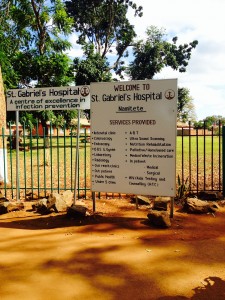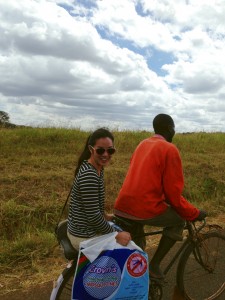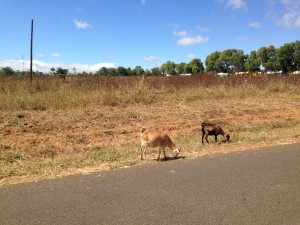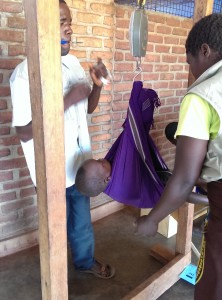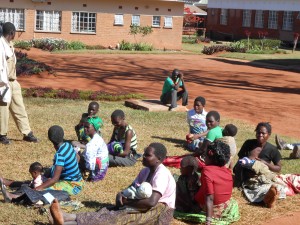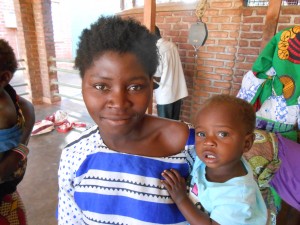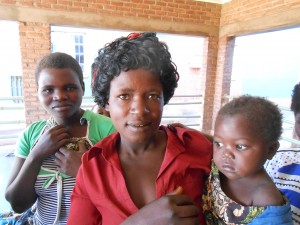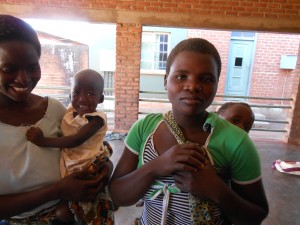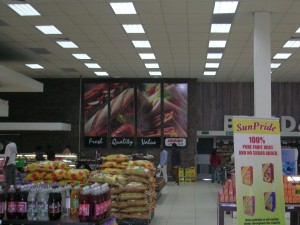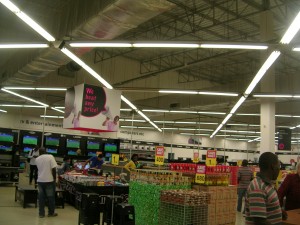Over the week that we’ve been in Malawi, we’ve slowly been getting to know St. Gabe’s and Namitete. The people here have all been ridiculously nice and welcoming to us, so that even though we’ve been here for such a short period of time, we’re already starting to feel like part of the St. Gabriel’s/ Namitete family!
Entrance to St. Gabe’s First time on a bike taxi! The goats in Namitete are like the Rice squirrels— they’re everywhere and know no fear
Under-5 Clinic
Last Friday, we visited the under-5 clinic at the hospital to get a sense of how the community health workers operated it, as well as showing them Jesal’s design, Babymetrix—a single device that can take the height, weight and head/arm circumference of a baby to help diagnosis malnutrition. The clinic itself brought in kids (and their mothers) from local villages who were suffering or recovering from malnutrition to check up on their development (i.e. height, weight and arm circumference measurements). This is incredibly important work especially as up to 46% of children in Malawi are stunted [1]. The community health workers who ran the clinic also gave out some nutritious food and educated the mothers on proper child nutrition.
How babies are weighed Learning about nutrition
All the mothers were so eager to get their picture taken, but given our lack of meaningful Chichewa vocabulary, there was a lot of gesturing followed by all of us laughing at our struggles. A lot of people have been trying to teach us Chichewa (and its been a blast!), but probably the most useful phrase so far has been ndikuphunzila Chichewa pangono (I’m learning Chichewa very slowly) just to get across the extent of our knowledge.
Lilongwe
On Saturday, we visited Lilongwe (the capital of Malawi), mostly to get desperately needed internet “dongles” as well as some groceries. After we got our dongles, we headed to a large shopping center. Once inside, it was almost as if we had been transported to an American HEB or Target—there were huge flat-screen TVs lining a wall and huge pictures of piles of delicious-looking produce with captions like fresh and value hanging below them.
While we’ve only been here for such a short period of time, it seems that Malawi is in a period of flux—the traditional Malawian blending with the western, most noticeably in the city but also extending out into the rural areas. However, the obvious dichotomy in lifestyle between rural Namitete and the up-scale parts of Lilongwe was a bit surprising; while we had learned academically about these harsh realities, it was still emotionally jarring to actually see.
Developing countries are vary rarely uniformly poor, rather it seems that to better understand ‘development’ (a word that I really don’t like, but that’s a discussion for another time), knowledge of the inequality among the population must be included along with the absolute wealth of individuals. The juxtaposition of the multitude of malnourished kids at the clinic with the long aisles of fresh, refrigerated vegetables in Lilongwe especially seemed to reflect the vast structural inequalities of the country.
However, there does seem to be signs that the situation is improving across the country—poverty, hunger and HIV prevalence in Malawi have all been reduced significantly over the past couple years [1]—and programs like the malnutrition clinic that St. Gabes spearheads are doing a lot to continue that trend.
Be sure to check out Jesal’s blog for another great discussion on issues surrounding wealth disparities in Malawi!
Quotes of the day:
“Malawi is a poor country—we don’t have oil or coal or minerals, but that also means that the States have left us alone” – Namitete Resident
“Just in case” -Jesal (always)
